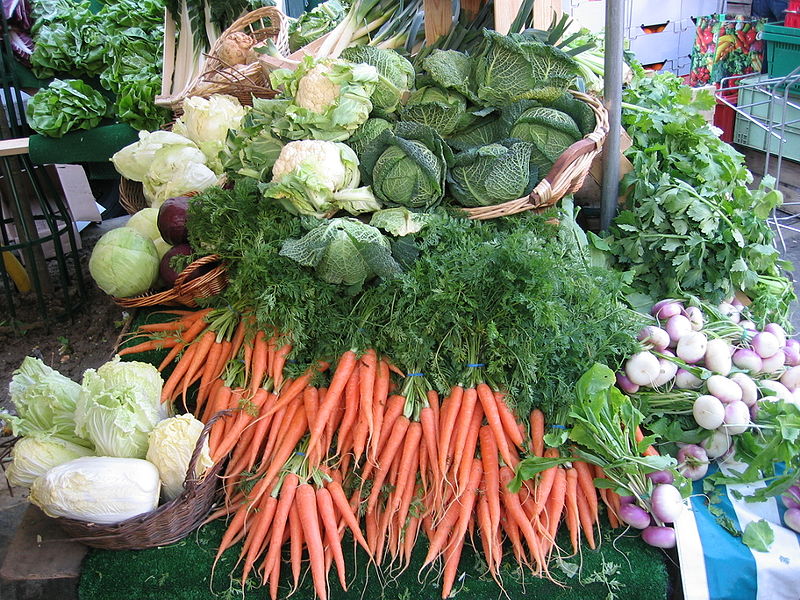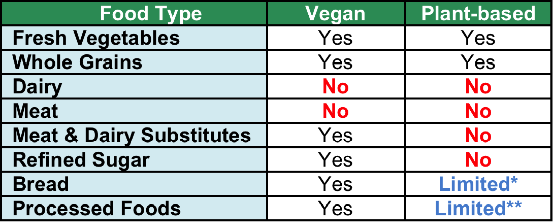 The terms vegan and plant-based have been used interchangeably as a way to describe those that do not eat animal products. However, the two types of diets are very different.
The terms vegan and plant-based have been used interchangeably as a way to describe those that do not eat animal products. However, the two types of diets are very different.
Vegan: A vegan diet focuses on the exclusion of animal products (meat and dairy). Some vegans have strong feelings about animal rights and choose to eliminate all types of animal products from their lives, including clothing (wool, silk, leather) and personal hygiene (soaps, lotions, perfumes). They even avoid foods and other products that come from insects (honey, beeswax).
Although we are slowly becoming aware of the link between consuming animal products and our health, a vegan diet is not always healthy. When a person’s food choices focus primarily on the exclusion of animal products, his/her diet is not necessary nutritionally balanced. Instead of adding a variety of whole plant-based foods, many vegans use carbohydrates and/or heavily processed foods (prepackaged and prepared meals, soy based seasoned faux meat and cheeses) to balance out their meals.
The food industry uses the term vegan to identify foods that do not include animal products. However, a lot of these food items contain additives and chemical processing in order to reproduce a similar flavor or texture of a non-vegan product (i.e. vegan mayo, cheese, sausage, bacon, burgers, etc.).
Plant-based: Although a plant-based diet, similar to a vegan diet, excludes all animal products (meat, fish, dairy, gelatin), a plant-based diet emphasizes the nutritional value of what you eat rather than what you don’t, focusing on whole natural plant foods (vegetables, legumes, whole grains, nuts and seeds, and fruits). By placing attention on natural foods, plant-based consumers avoid heavily processed foods that contain chemicals, additives and refined sugars (junk food, soft drinks, prepackaged meals, meat and dairy substitutes).
While a plant-based meal qualifies as vegan, a person who follows a plant-based diet is not necessarily a vegan in regards to animal rights and the exclusion of all animal products from clothing to cosmetics. Conversely, someone who is vegan may not be eating a plant-based diet because their food choices include heavily processed foods.
Unfortunately, the term plant-based is not yet recognized as a food identifier in the food industry. This creates a challenge for people eating a plant-based diet as they seek out foods that contain only natural ingredients. As a result, reading food labels becomes a required skill. When eating out, it’s always a good idea for the plant-based consumer to preview a restaurant’s menu prior to dining in order to determine what adjustments may need to be requested for the meal. Consequently, plant-based consumers are drawn to preparing their own meals, learning and experimenting how to cook from scratch.
Below is a chart of what might be consumed for either diet.
* A plant-based diet consists of breads made with whole plant ingredients (such as sprouted grains) and no refined sugars or chemical additives.
** A plant-based diet includes only minimally processed foods (whole grains ground into flour or made into pasta, naturally made soy or nut milks) that use whole plant-based foods without chemical additives and refined sugars.


This is so helpful! Any place for eggs in plant-based diet? I eat an occasional pasture-raised egg, from a neighbor’s back-yard chickens. Other than that, just whole foods from plants, that I prepare from scratch. And a few store-bought, minimally-processed foods, all from plants.
We are so glad you found the article helpful! Unfortunately, eggs are not a part of a plant-based diet. But it sounds like the rest of your diet is. Congrats! It can be hard to eliminate all animal products. You may want to consider re-evaluating why you still include eggs in your diet. Are you holding on to the old belief that it’s the best source of protein and iron? Or do you enjoy eating them and don’t want to give that up? Being conscious about why you eat what you eat will help you decide how to create the diet that is best for you. Good luck! And thanks for reading our posts! 🙂
great post!